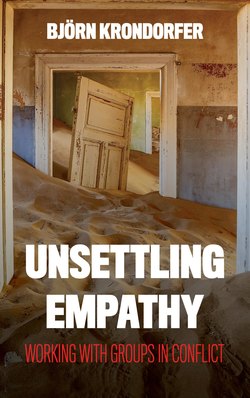Читать книгу Unsettling Empathy - Bjorn Krondorfer - Страница 5
На сайте Литреса книга снята с продажи.
Unsettling Empathy
ОглавлениеThe particular practice of care that feeds and inspires this book is my facilitation of workshops and interactive seminars with groups that find themselves in conflict, past and present. This book does not look at efforts of reconciliation, peace-building, and conflict resolution through an analysis of theory, legal frameworks, truth commissions, or human rights organizations. Nor does it do so through a critical study of history, literary texts, or memorial sites. Rather, this book’s approach is that of thick description and judicious reflection on materials drawn from my facilitation work that I have called elsewhere reconciliatory processes, intergroup reconciliation, intercultural encounters, or intercultural memory work.[6] I will share observations about these processes, at times in descriptive detail, to illustrate the painstaking labors and deliberations necessary for working with groups in conflict. While attentive to context and the relevant literature, I will unfold and elucidate the bearing of these materials on helping us to understand the dynamics of conflict, which are often enmeshed in historical traumata and passed on collectively through narratives and memories. The purpose of these deliberations is to improve candid interpersonal and intergroup communication,[7] reduce communal mistrust, mend broken relations, and seek commitments for mutual support in the face of past and current conflict. On one level, these are modest goals, and they do not easily translate into grander political solutions; on another level, when these processes thrive, they demonstrate the best of the human spirit and validate a visionary ethics of interrelatedness.
Empathy plays a vital role in these processes. Empathy is a complex and complicated phenomenon that is not without its critics, who occasionally alert us to its dark side.[8] Hence, empathy needs a qualifier to distinguish it from related phenomena, such as pity, compassion, sympathy, benign paternalism, idealized identification, or voyeuristic appropriation. The word “unsettling” is just this crucial ingredient without which I would hesitate to bring empathy into our conversation when seeking pathways to mitigate current conflicts and to lessen the brunt of historical trauma.
“Unsettling empathy” is a marvelously ambiguous phrase, for it can be read in two ways. If “unsettling” is read as a verb in the form of a gerund, then we are about to “unsettle” empathy—that is, we set out to dismantle, dislodge, or invalidate empathy as a moral good. But if we read “unsettling” as an adjective, it qualifies the noun “empathy.” In this case, empathy unsettles us. I am mainly interested in the latter. We need, of course, to keep in mind the caution expressed in the first case—that is, reading “unsettling” as a gerund—for this provides a critical antidote to the ease with which pity and compassion can be appropriated for self-interested purposes. However, in this book I pursue the second meaning, wherein empathy unsettles us. This dimension—or, better, dynamic—of empathy has the force to unsettle our complacencies. It unsettles our unquestioned assumptions of how the world is supposed to operate according to our own political imaginations and psychoemotional comforts. It unsettles our taken-for-granted views of ourselves and our neighbors and questions our embeddedness in national and sacred histories. Unsettling empathy can pull us out of self-absorption and self-centeredness. Such “unsettling” might occur for the duration of only a few moments, but it is a disruption of significant transformative potential that moves us toward an other-directed care.
